It’s crazy how day-old bread can turn into something as delicious and decadent as Bread Pudding! This simple dessert (or breakfast) is the perfect way to use up leftover ingredients in a way that feels special—and hopefully, without dropping a dime! Best of all, when it comes to throwing together this bread pudding recipe, time does most of the work. Bread Pudding is one of my go-to dessert recipes because it is flexible, budget-friendly, and comes together effortlessly.
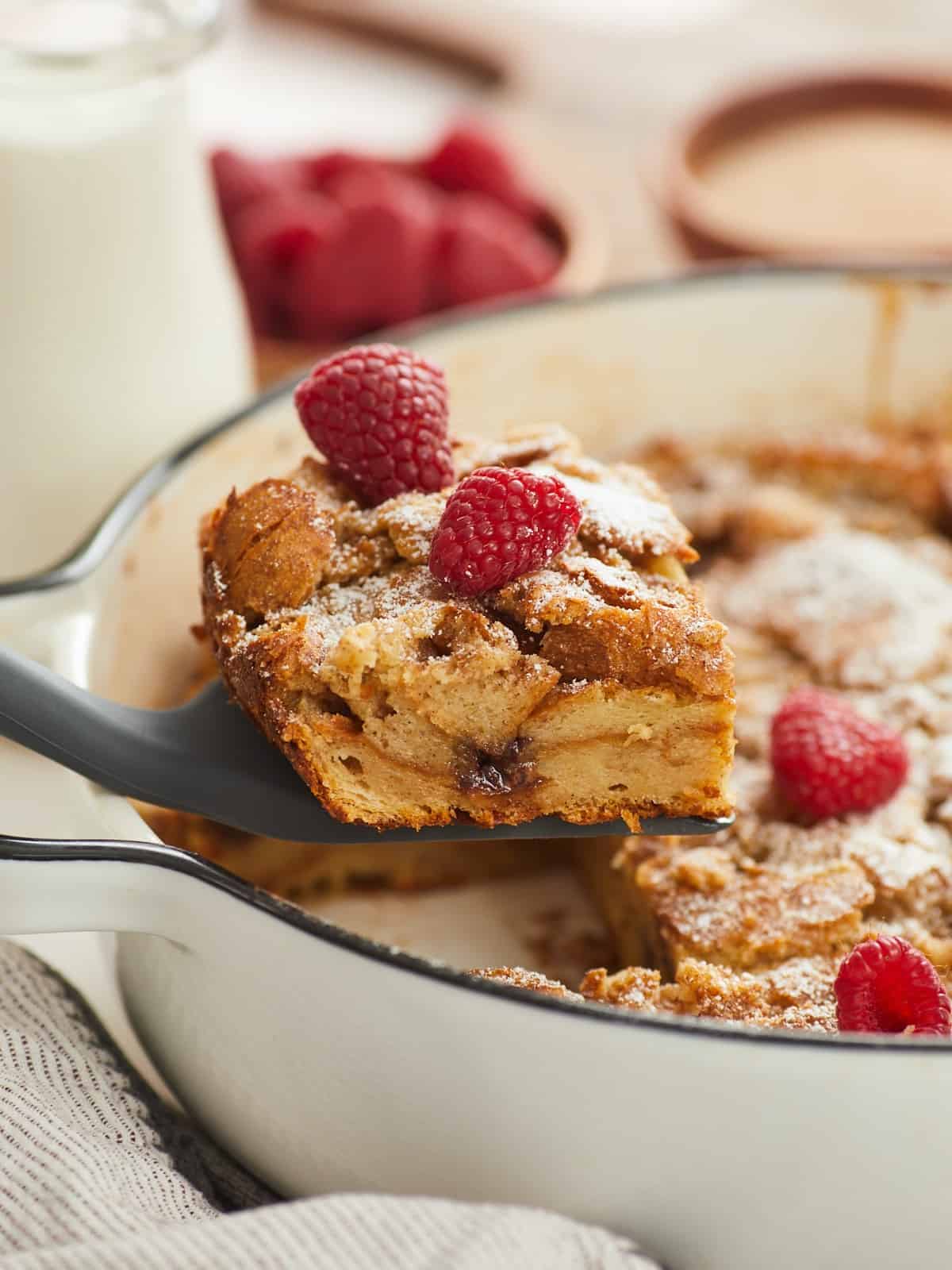
All recipes are rigorously tested in our Nashville Test Kitchen to ensure they are easy, affordable, and delicious.
WHAT IS BREAD PUDDING?
Bread Pudding is a sweet or savory casserole made from torn pieces of day-old bread that are dried out, soaked in custard, and then baked. Since the need for repurposing old bread is truly universal, ancient recipes for Bread Pudding can be found in pretty much every cultural cuisine on Earth. Our recipe is loosely inspired by one of Princess Diana’s favorite desserts, “Bread and Butter Pudding.” This Old English version of the dish is flavored with cinnamon, vanilla, and raisins.
Ingredients for Bread Pudding
Bread pudding is an extremely versatile recipe and there are quite a few ways it can be customized. But here’s what you’ll need to make this classic bread pudding recipe:
- Bread: Bread is the body of the “pudding” and acts as a sponge to soak up all of that deliciously rich custard. You can use brioche, challah, burger buns, unflavored dinner rolls, sandwich bread, or just about any other bread you have on hand.
- Butter: Butter is used to grease the baking dish and add extra richness to the casserole.
- Eggs: Eggs combine with the dairy to create a rich custard. Eggs solidify when baked, which helps the custard “set” into its soft and creamy texture.
- Half & Half: We used half & half (a 50/50 mixture of whole milk and heavy cream) as the base for our custard because it’s rich and creamy, but still has a lot of moisture. You can experiment with other dairy products, like heavy cream, whole milk, buttermilk, or an extra-creamy, unsweetened alternative milk, keeping in mind that the creaminess of your dairy will affect the richness of the custard. Yogurt, sour cream, and softened cream cheese can also be thinned with milk.
- Sugar: Since we’re making a classic sweet bread pudding, we’ve added a hefty dose of granulated sugar. You can experiment with other sweeteners like light or dark brown sugar, honey, or maple syrup.
- Seasoning: We flavored our bread pudding with a warm combination of cinnamon and vanilla.
- Add-ins: We stirred chocolate chips into our bread pudding, but you can add other ingredients like raisins, nuts, or even shredded coconut.
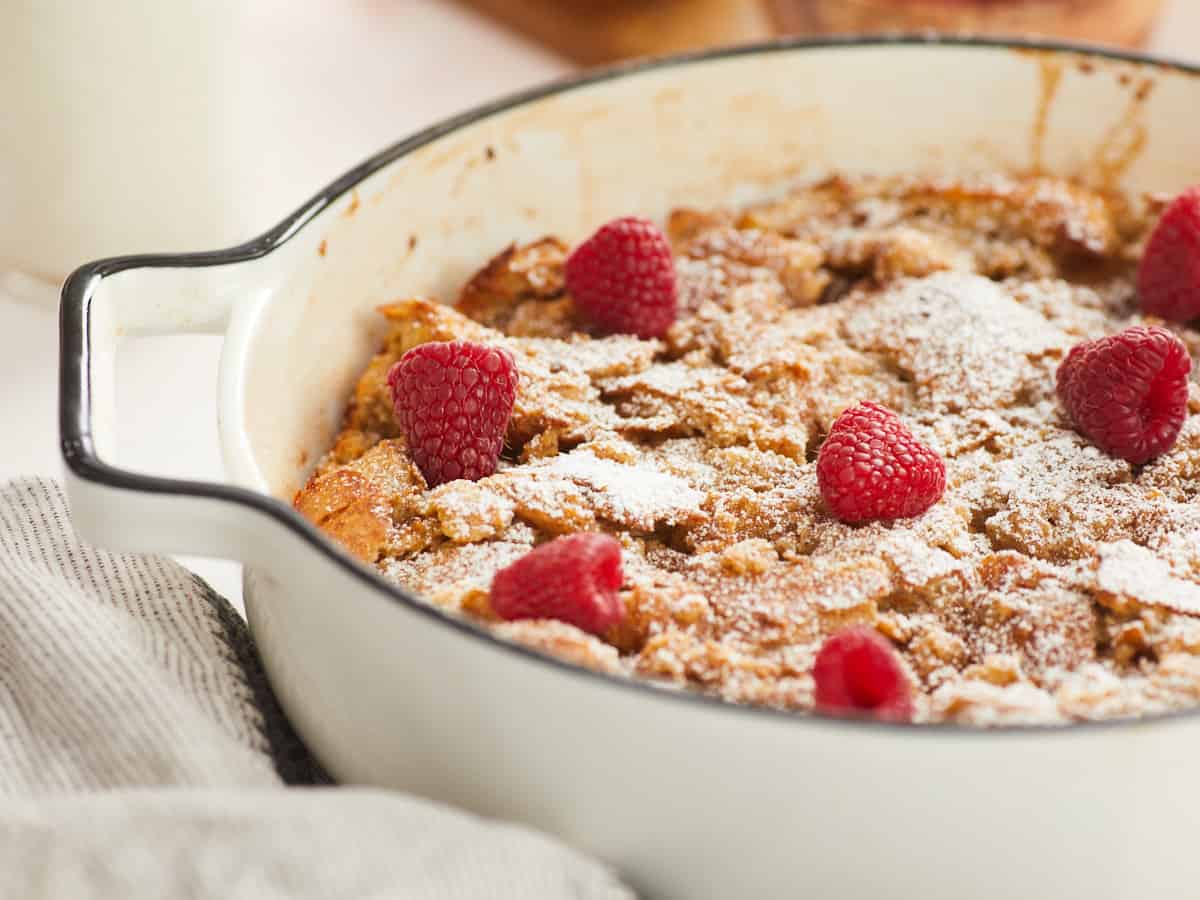
What Kind of Bread to Use for Bread Pudding
You can use virtually any kind of bread for Bread Pudding or combine the leftovers of different types to make up a full loaf. (No need to buy more!) Softer styles of bread will give the pudding a custardy texture while harder types will make the pudding more spongy. You want the bread to be dried out, but not so tough or hard it can’t soak up the custard.
HOW TO DRY OUT BREAD
If your bread is fresh from the package or still not dry enough when you are ready to assemble the Bread Pudding, try this method for drying out bread:
- Preheat the oven to its lowest possible setting (150-200℉). Tear up the bread and lay it out on a parchment-lined baking sheet.
- Once the oven has preheated, put the tray of torn bread in the oven and immediately turn off the heat. Leave the oven door slightly ajar (if needed, prop it open with a wooden spoon), which will quickly lower the temperature and create air circulation.
- The bread should be thoroughly dried out in 8-12 minutes, depending on the type and moisture level of the bread. Keep an eye on it, so it doesn’t turn into toast! The outer edges of the torn bread will be rough to the touch and the pieces should feel slightly dried out, but should not crumble or take on any color.
Bread Pudding Variations
Bread pudding is super versatile and can be made with both sweet and savory flavors, making it a great way to use up leftovers in your pantry or fridge. Here are some other great bread pudding flavor ideas:
- Apple Cinnamon Bread Pudding
- Pumpkin Bread Pudding
- Kale, Swiss and Mushroom Strata
- Carrot Cake – grated carrot, cream cheese custard, walnuts, golden raisins, and coconut flakes
- Eggnog – Replace the vanilla with dark rum, and nutmeg for the cinnamon
- “The Elvis” – banana slices, peanut butter (melted and then mixed into the custard), roasted peanuts, and little pieces of bacon
SERVING & STORING
You can serve Bread Pudding warm or cold. I love it fresh from the oven, topped with a scoop of vanilla ice cream, but you could also serve it with whipped cream, fresh or cooked fruit, caramel sauce, or chocolate syrup.
Leftovers will keep in the fridge for 4 days. Reheat the bread pudding gently in the oven at 325℉ for 10-15 minutes. We also tried reheating some in the air fryer and it was excellent! Bread pudding can also be wrapped tightly and frozen for about three months. Allow the frozen bread pudding to thaw in the refrigerator overnight before reheating.
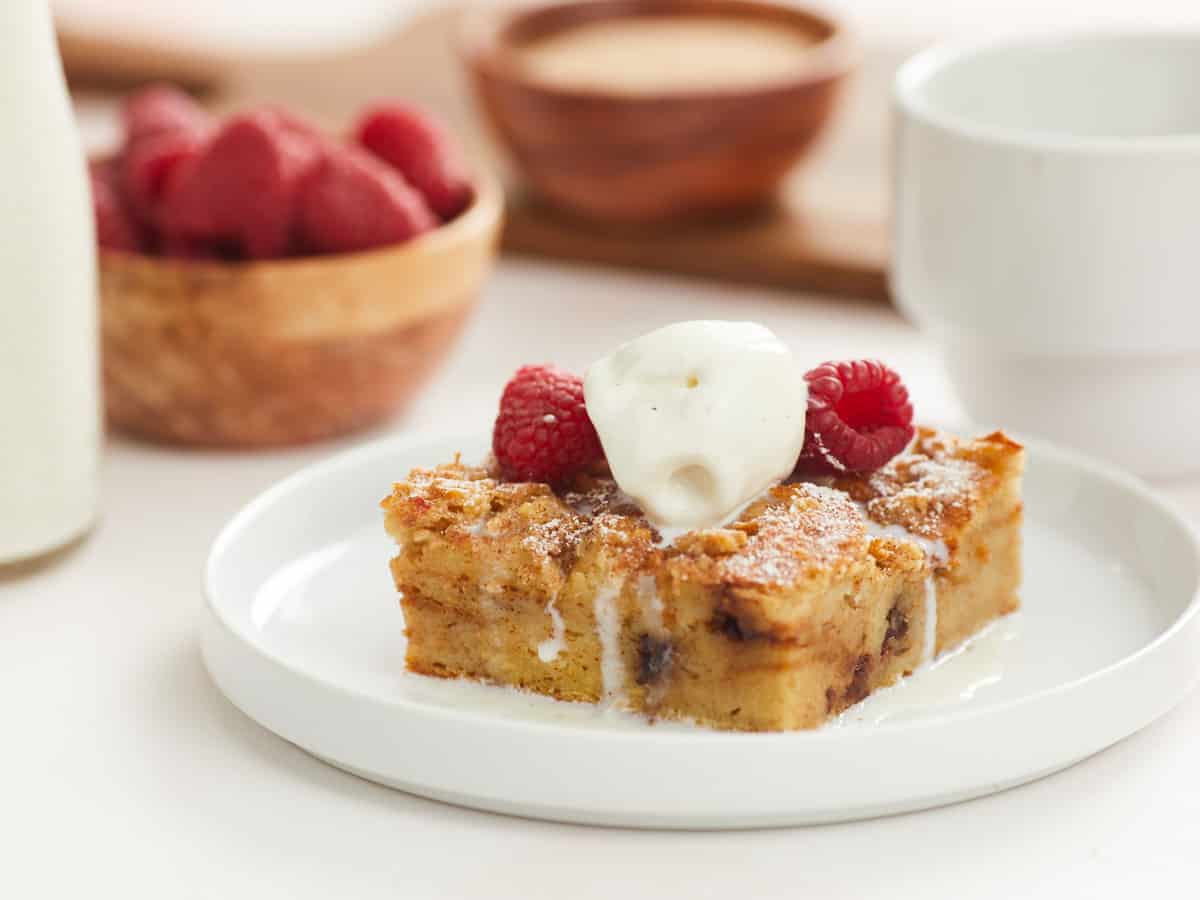
Bread Pudding
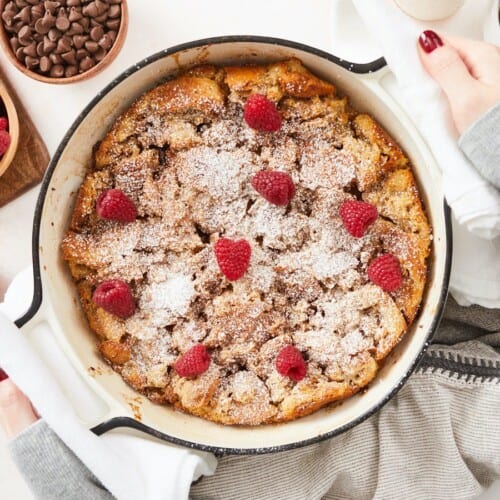
Ingredients
- 3 Tbsp butter, divided ($0.45)
- 8 cups day-old bread, torn into 1" pieces ($2.00)
- 3 large eggs ($1.17)
- 2 cups half and half* ($1.99)
- 2/3 cup sugar ($0.22)
- 2 tsp cinnamon ($0.20)
- 1 tsp vanilla extract ($0.28)
- 1/4 tsp salt ($0.01)
- 1/4 cup chocolate chips ($0.34)
Cinnamon Sugar Topping
- 1 Tbsp sugar ($0.02)
- 1/2 tsp cinnamon ($0.05)
Instructions
- Tear the day-old bread into 1” pieces, and spread them out on a parchment-lined baking sheet until dried out but not hard.
- Liberally grease a baking dish with about 1/2 tablespoon of butter. Melt the remaining butter in a small saucepan or microwave. Allow the melted butter to cool slightly but not enough to solidify.
- In a large mixing bowl, whisk together the eggs, half & half, vanilla extract, ⅔ cup of sugar, 2 tsp of cinnamon, and salt. Once combined, slowly stream in the melted butter, whisking constantly to incorporate.
- Add the pieces of bread to the egg mixture a few handfuls at a time, tossing gently to coat in the custard. Once all the bread has been added to the bowl, let it sit for 1-2 minutes to soak up as much of the mixture as possible.
- Transfer half of the soaked bread to the prepared baking dish. Sprinkle in the chocolate chips and any other mix-ins you’d like, and then cover with the rest of the soaked bread. Scrape any liquid left in the bowl on top of the casserole. Tuck in any mix-ins (especially chocolate) visible from the top of the bread pudding to keep them from burning in the oven.
- Cover the filled casserole dish with aluminum foil and let it soak at room temperature for least 30 minutes (up to 2 hours), or refrigerate overnight.
- Preheat the oven to 375℉. If the bread pudding was refridgerated, let it warm slightly before placing in a hot oven (especially if using a glass baking dish).**
- Bake the bread pudding, covered, for 30 minutes. Meanwhile, mix sugar and cinnamon for the topping in a small bowl and set aside.
- Remove the foil, and sprinkle the cinnamon-sugar topping evenly over the pudding. Continue baking, uncovered, for another 20-25 minutes or until the top of the casserole is crunchy and deeply golden brown.
See how we calculate recipe costs here.
Equipment
- Liquid Measuring Cup
- Glass Casserole Dish
- Parchment Paper
Notes
** Ice-cold glass dishes can crack or explode in a hot oven if the temperature change is too extreme.
Nutrition
How to Make bread pudding – Step by Step Photos
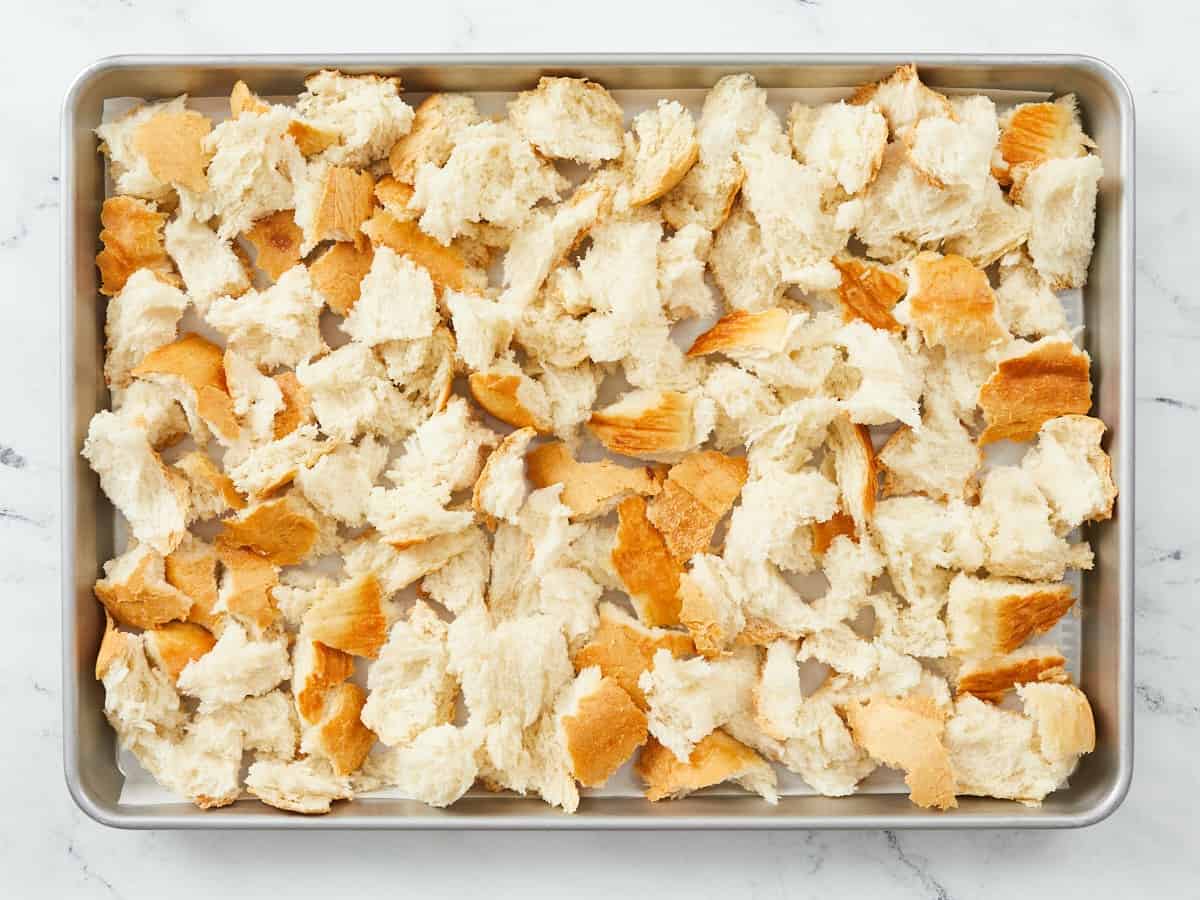
Tear 8 cups of bread (about 1 loaf) into 1” pieces, and spread them out on a parchment-lined baking sheet until dried out but not hard. For more guidance on how to properly dry out your bread, check out the tips in the blog post above!
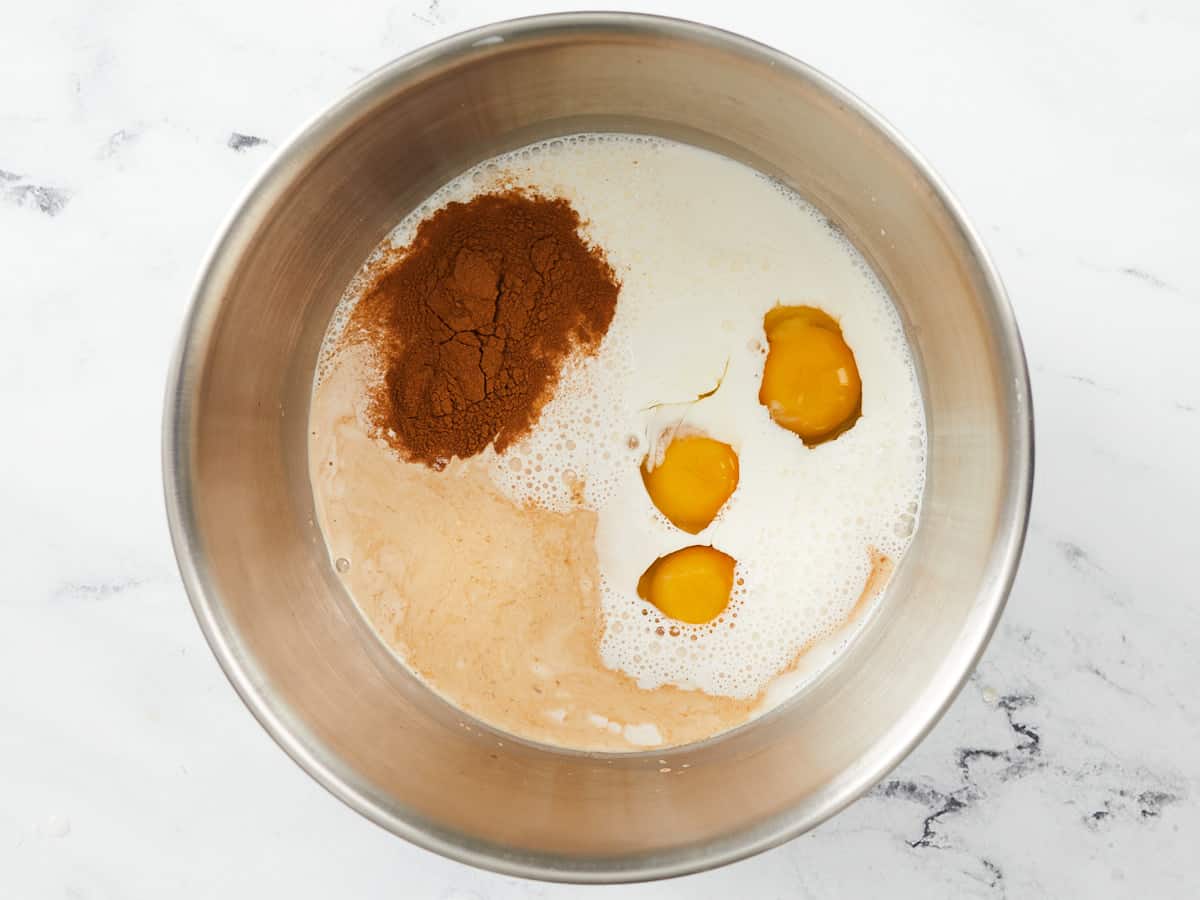
In a large mixing bowl, whisk together the 3 eggs, 2 cups of half and half, 1 teaspoon of vanilla extract, ⅔ cup of sugar, 2 tsp of cinnamon, and 1/4 teaspoon of salt to make a custard.
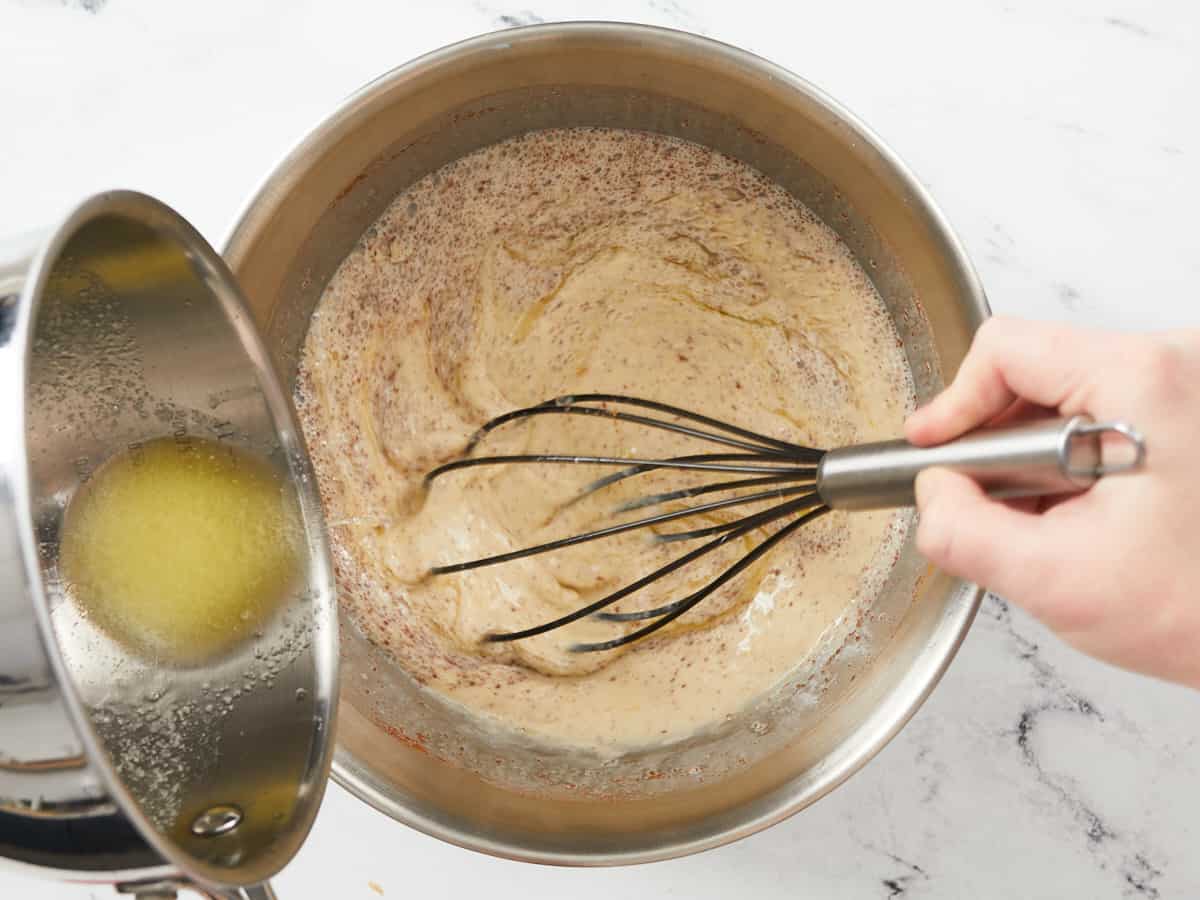
Liberally grease a baking dish with about 1/2 tablespoon of butter. Melt the remaining butter (about 2 1/2 tablespoons) in a small saucepan or in the microwave. Let it cool slightly (to prevent it from scrambling the eggs), and then slowly pour the melted butter into the custard, whisking constantly to incorporate it.
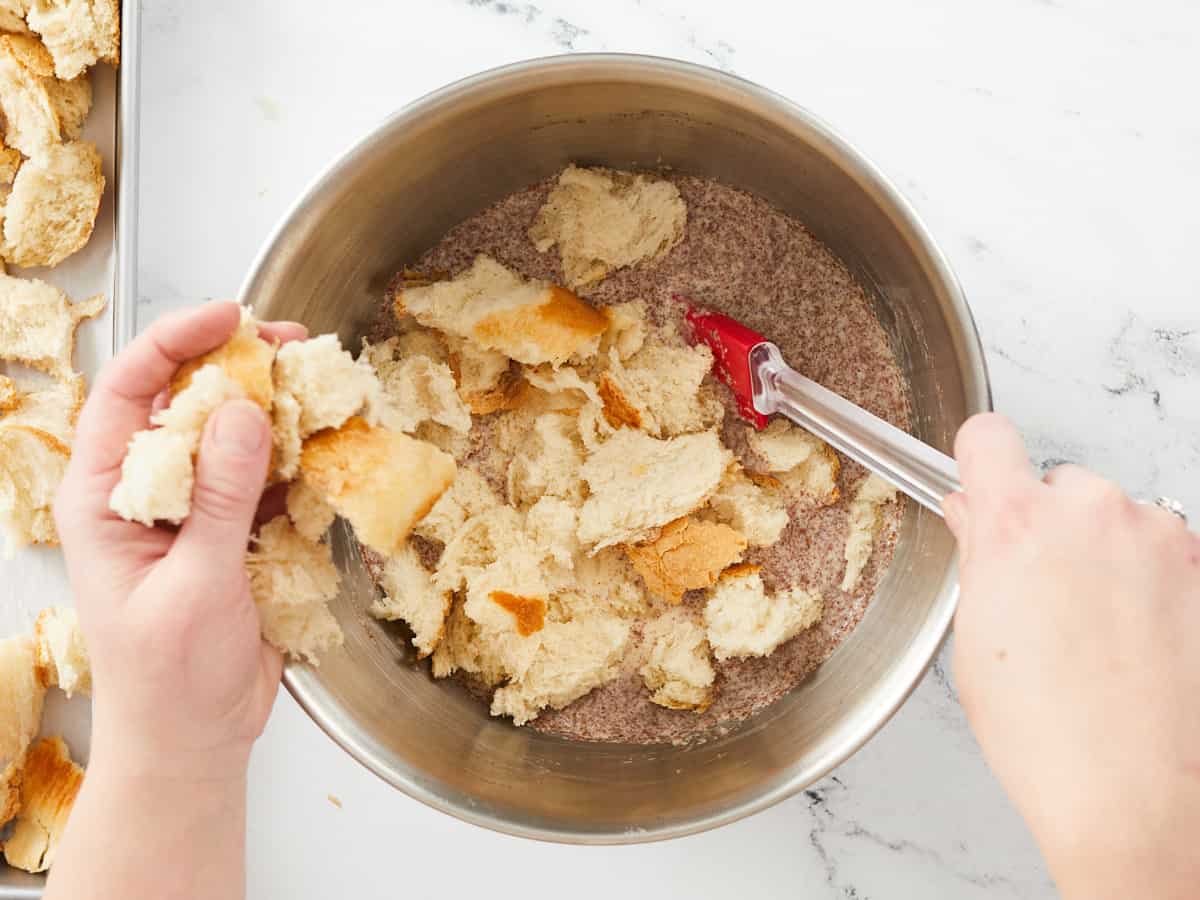
Add the pieces of bread to the egg mixture a few handfuls at a time, tossing gently to coat in the custard.
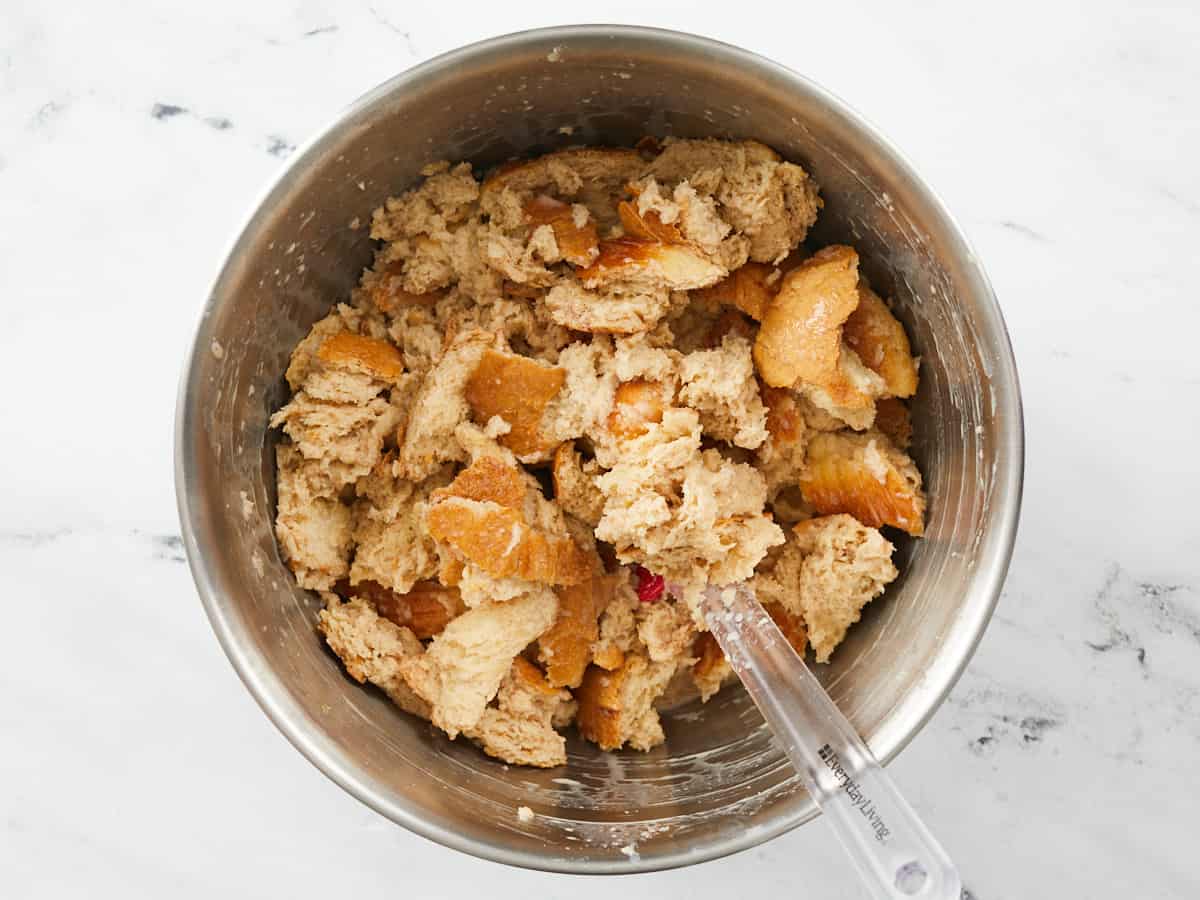
Once all the bread has been added to the bowl, let it sit for 1-2 minutes to soak up as much of the mixture as possible.
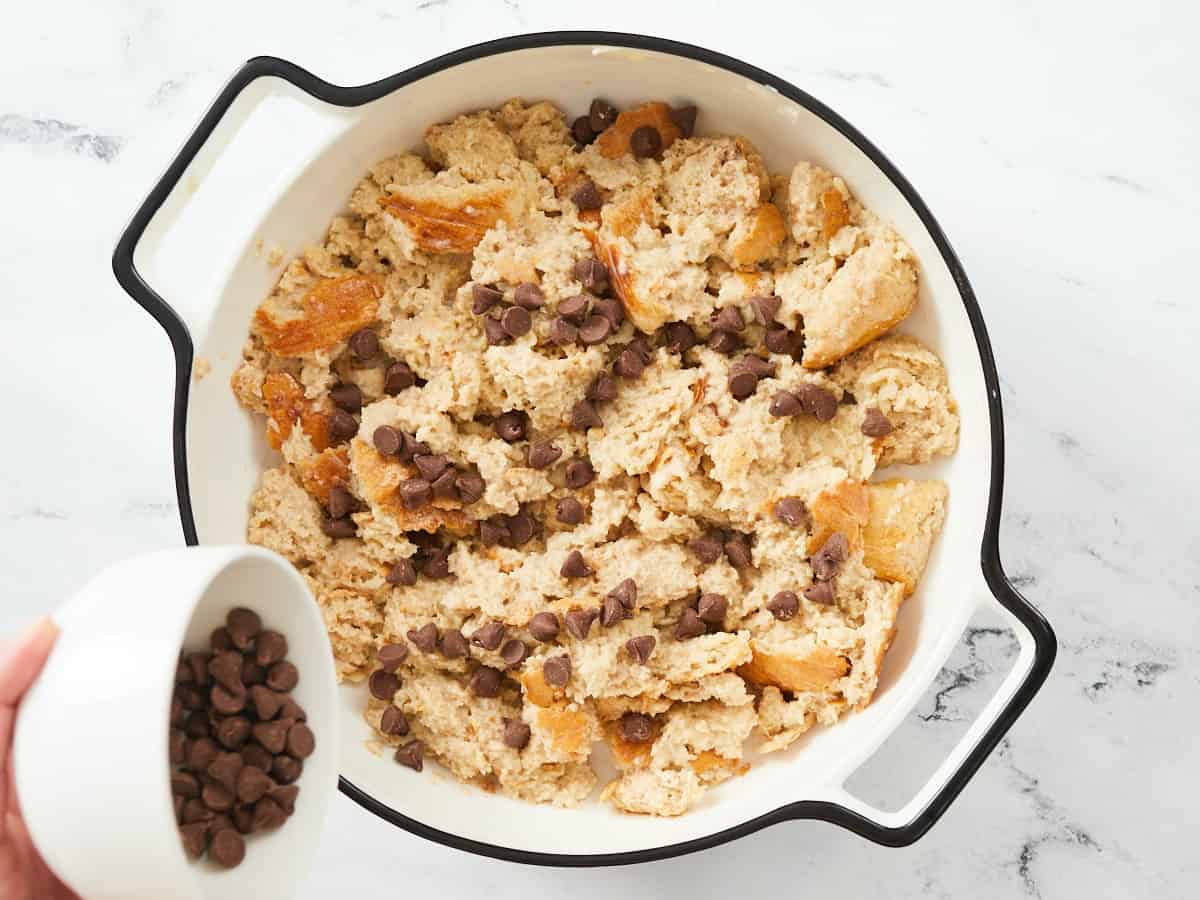
Transfer half of the soaked bread to the prepared baking dish. Sprinkle in the chocolate chips and any other mix-ins you’d like, and then cover with the rest of the soaked bread. Scrape any liquid left in the bowl on top of the casserole. Tuck in any mix-ins (especially chocolate) visible from the top of the bread pudding to keep them from burning in the oven.
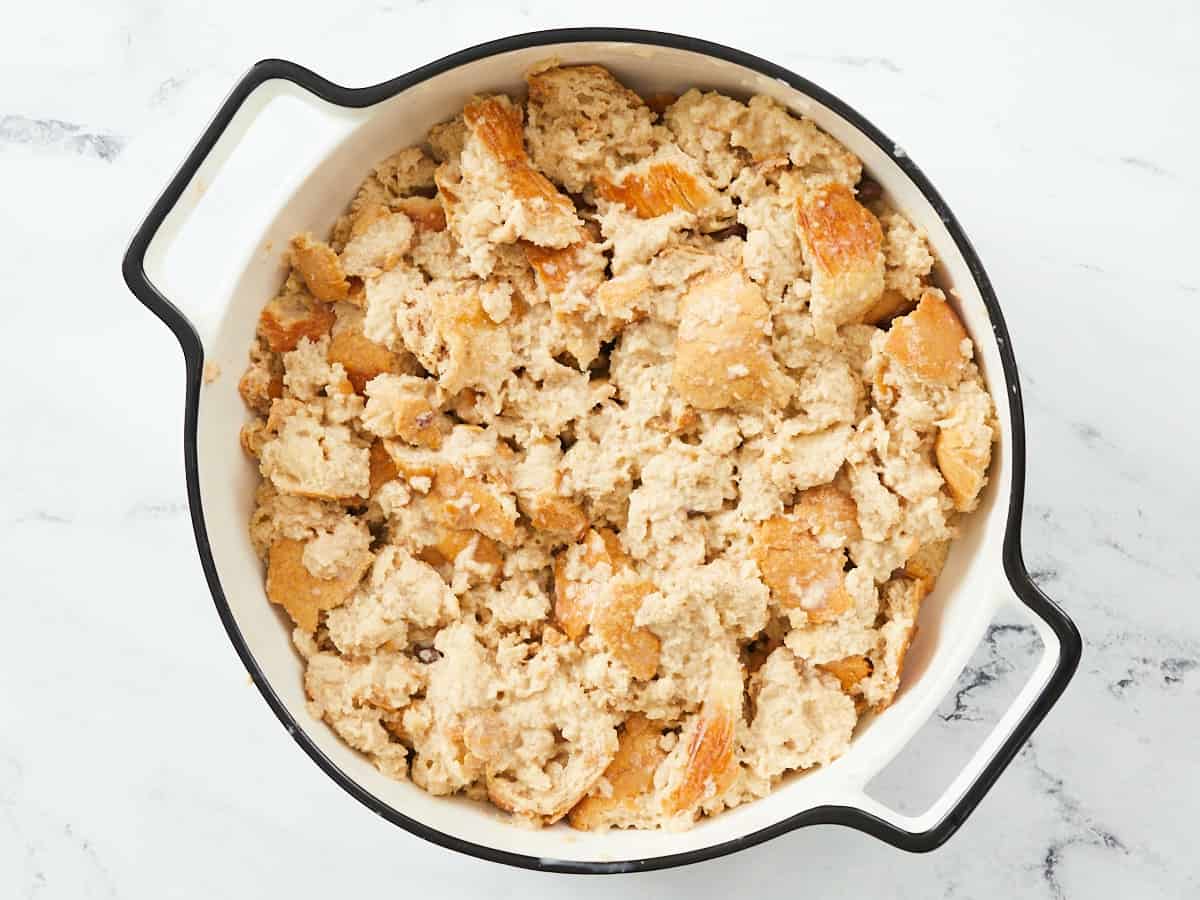
Cover the filled casserole dish with aluminum foil and let it soak at room temperature for at least 30 minutes (up to 2 hours), or refrigerate overnight. Preheat the oven to 375℉. If the bread pudding was refridgerated, let it warm slightly before placing it in a hot oven (especially if using a glass baking dish). Bake the bread pudding, covered with aluminum foil, for 30 minutes.
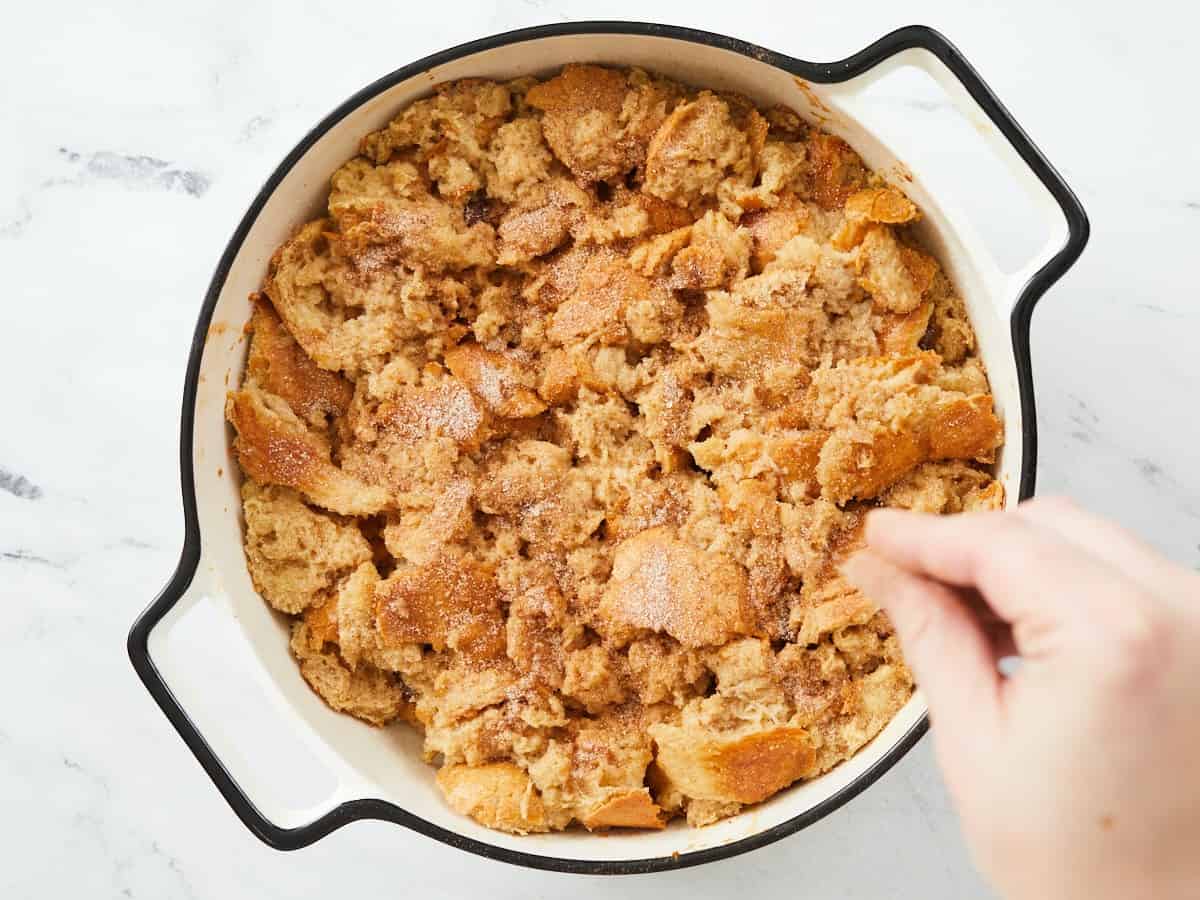
Meanwhile, mix the sugar and cinnamon for the topping in a small bowl and set aside. After the bread pudding has baked the first time, take it out of the oven, remove the aluminum foil, and sprinkle the cinnamon-sugar topping evenly over the pudding.
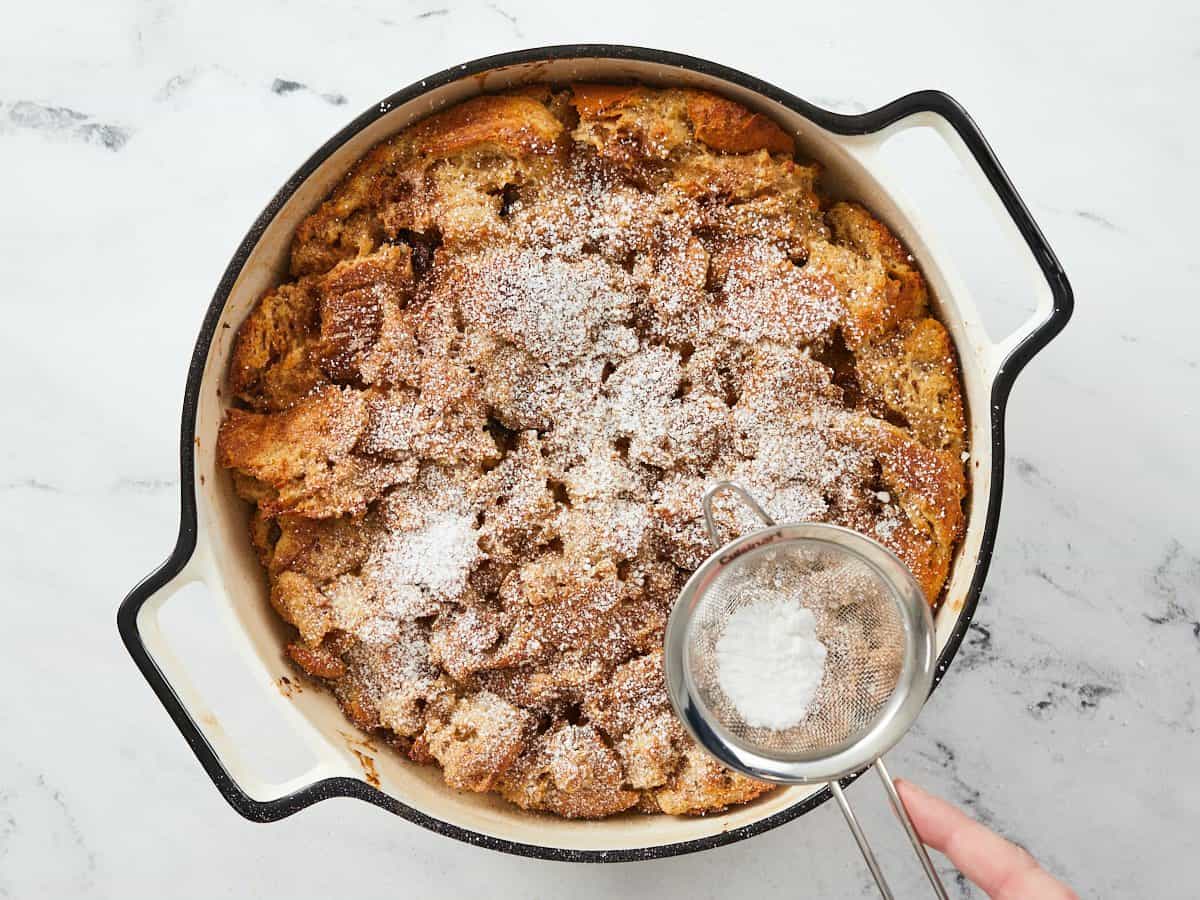
Continue baking, uncovered, for another 20-25 minutes or until the top of the casserole is crunchy and deeply golden brown. If desired, dust the top of the baked casserole with powdered sugar before slicing and serving.
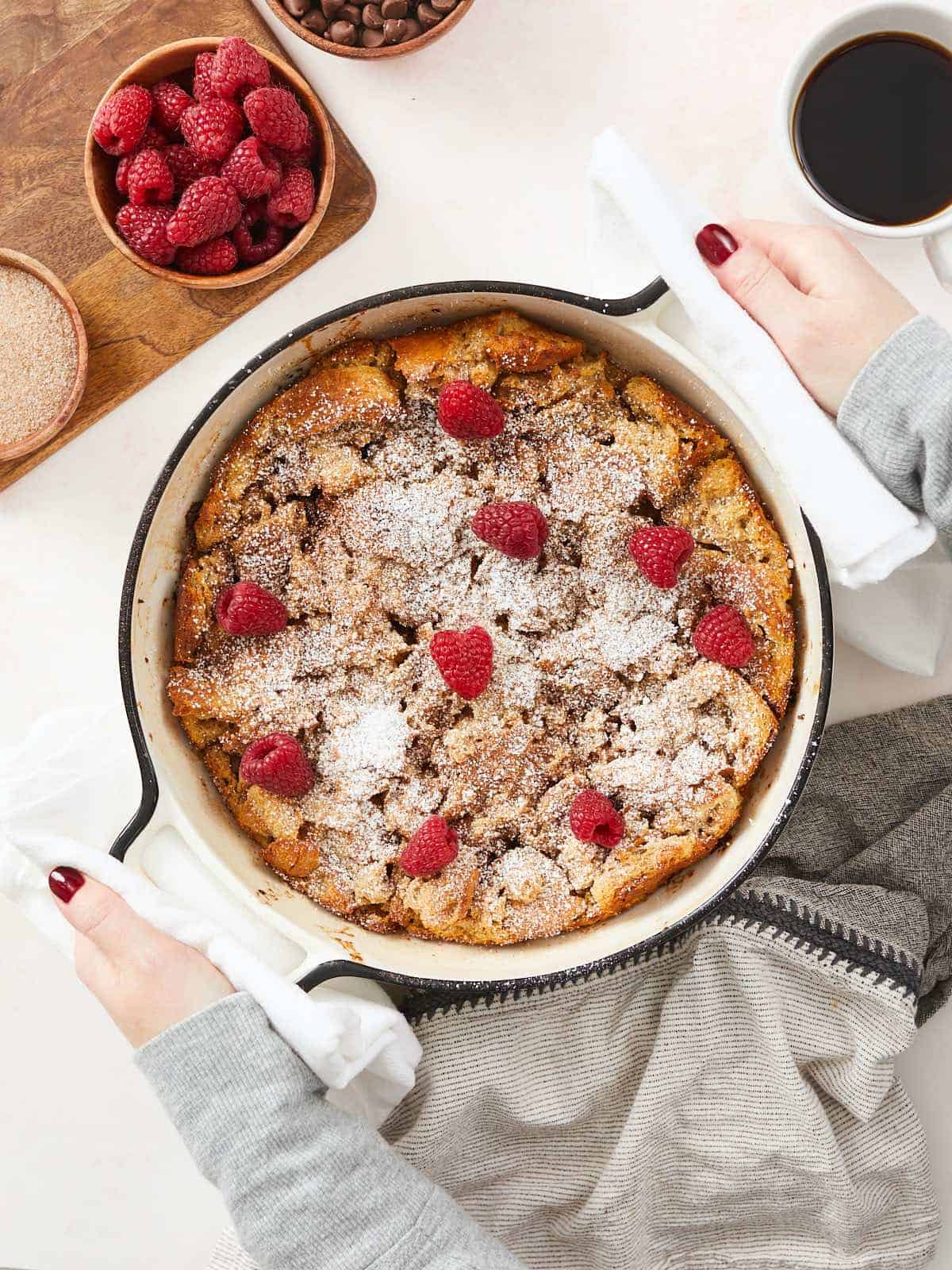
Ooh, girl! Look at that SWIRL!


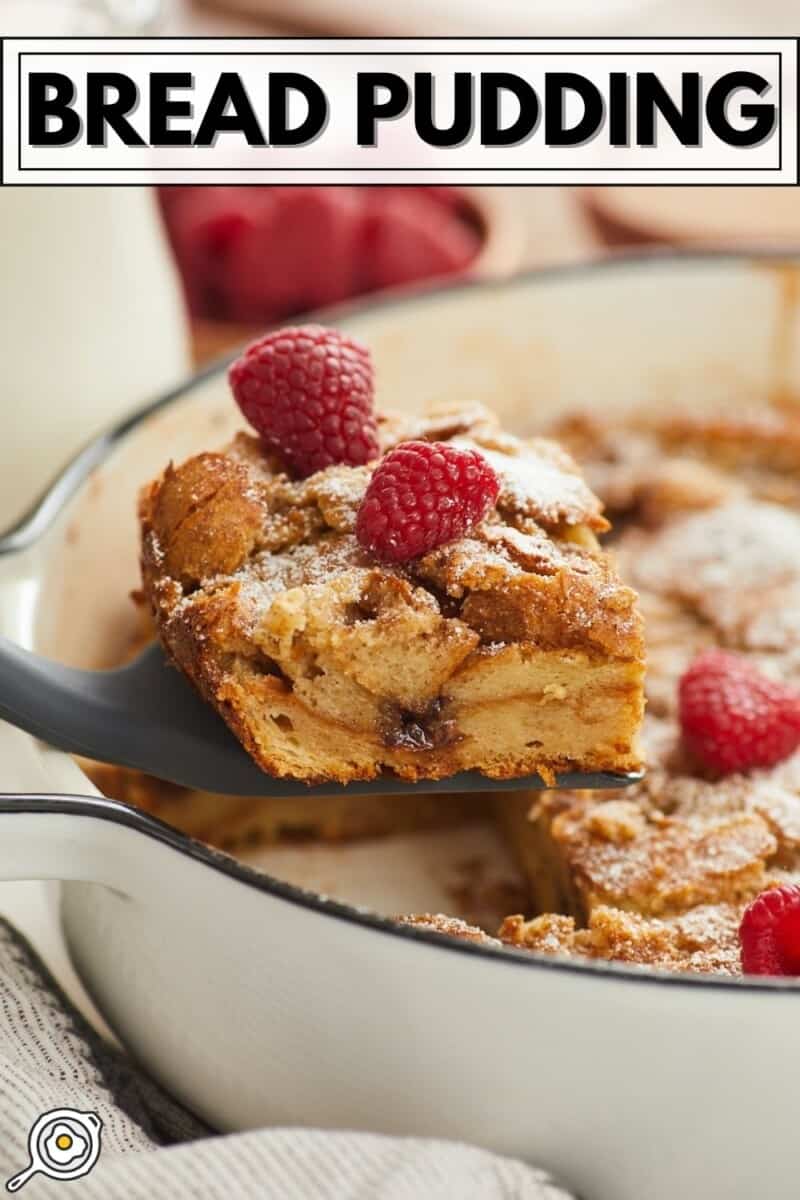

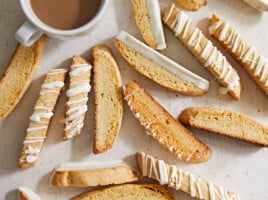

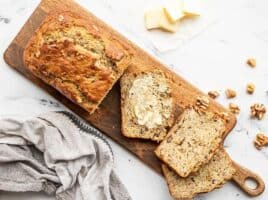
Made this today from club rolls that got stale. Delicious! I’ll definitely do it again.
I love the simplicity of this recipe! It’s my go to for bread pudding. And living in Louisiana, I make a lot of bread pudding. It’s always a crowd pleaser.
I made this recipe, using day-old French bread and it turned out great. The glass baking dish was placed on the middle oven rack to avoid possible breakage from the higher baking temp. That didn’t effect your suggested baking times.
However, I wanted to make the Creme Anglaise topping. Your suggested link led me to Martha Stewart’s website. In her recipe, there was controversy as to the correct amount of correct sugar usage (by 3 separate posts). Not even one response was received by any of the posts. I ended up going to a different website and successfully made the sauce.
Just thought you’d like to know, and maybe consider another resource for the recipe.
Thank you so much! We will fix that right away! XOXO -Monti